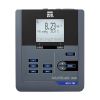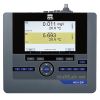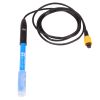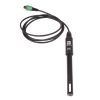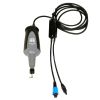YSI MultiLab 4010-3W Three Channel Benchtop Meter
The YSI MultiLab 4010-3W is ideal as a pH meter, ORP meter, conductivity meter, or BOD meter, both as a stand-alone device or as a combination meter for those parameters in the laboratory.
Features
- Three channel input for pH, ORP, DO/BOD, or conductivity
- 500 data set storage in manual mode; 10,000 data sets in automatic logging mode
- Large, easy to read color display
- Free ground shipping
- Expedited repair and warranty service
- Lifetime technical support
- More
Overview
The YSI MultiLab 4010-3W is ideal as a pH meter, ORP meter, conductivity meter or BOD meter as a stand-alone or combination meter for measuring parameters in the laboratory.
IDS Intelligent Digital Sensors
The IDS sensors automatically store their unique serial number and calibration data. In addition, they also digitally process the measurement signal. The sensors can be moved from instrument to instrument and maintain their calibration data and transmit this information to the new instrument.
- Digital sensor recognition, processing and data transfer
- Includes self-stirring BOD, pH, ORP and conductivity sensors
- BOD probe uses optical dissolved oxygen technology and includes a guarded sensor tip
Benefits
- Use non-IDS (other manufacturer's) pH or ORP sensors with a simple adapter for DIN or BNC
- Intelligent, digital sensors - plug and play sensors
- GLP traceability (sensors store serial # and calibration data)
- Antibacterial keypad
- USB connectivity to manage data
- 3-year warranty
Parameters: pH, ORP (mV), DO %, DO mg/L (BOD probe), Partial pressure, Conductivity, Resistivity, Salinity, TDS, Temperature
Measurement Channels: 3
Data Storage: 500 data sets in manual mode and 10,000 data sets in automatic mode
Interface/PC Connectivity: Mini USB; USB-A
Display: Color, Graphic
Keypad: Antibacterial
Power Supply: Universal power supply
Temperature Compensation: Yes; except ORP
Calibration Points: DO and Conductivity = 1; pH = 1 to 5
Calibration Storage: 10 maximun
Calibration Timer: 1 to 999 days
GLP Compliant: Yes
Certifications: CE, cETLus
Warranty: 3 years
- (1) Benchtop meter
- (1) Electrode stand
- (1) Universal power supply
- (1) Manual
- (1) Software CD
- (1) USB cable
In The News
From Paddles to Phytoplankton: Studying Vermont’s Wildest Lakes
For six months of the year, Rachel Cray, a third-year PhD student at the Vermont Limnology Laboratory at the University of Vermont, lives between a microscope and her laptop, running data. For the other six months, she is hiking and canoeing four of Vermont’s lakes, collecting bi-weekly water samples. Cray studies algal phenology across four lakes in Vermont, US, that have low anthropogenic stress—or in other words, are very remote. Funded by the National Science Foundation Career Award to Dr. Mindy Morales, the lakes Cray researches part of the Vermont Sentinel Lakes Program, which studies 13 lakes in the area and, in turn, feeds into the Regional Monitoring Network, which operates in the Northeast and Midwest US.
Read MoreReimagining Water Filtration: How Monitoring and Science Enhance FloWater Filtration Systems
Over 50% of Americans think their tap water is unsafe , according to the Environmental Working Group (EWG). Other recent surveys have found that number to be as high as 70% of persons surveyed. Whether due to increased public awareness of water quality issues or confusion about how municipal water sources are regulated, there is a clear distrust of tap water in the United States. According to industry expert Rich Razgaitis, CEO and co-founder of the water purification company FloWater, this issue creates a damaging cycle. Razgaitis explained that the health and environmental problems associated with contaminated water aren’t the only issues. As people become increasingly aware that some tap water is unsafe, they resort to bottled water.
Read MoreMonitoring New Hampshire’s Aquatic Ecosystems: Continuous Data Collection in the Lamprey River Watershed
New Hampshire’s aquatic ecosystems provide a range of ecosystem services to the state and region. Resources and services like clean water, carbon storage, climate regulation, nutrient regulation, and opportunities for recreation all depend on New Hampshire’s aquatic ecosystems remaining healthy. Jody Potter, an analytical instrumentation scientist at the University of New Hampshire (UNH), is studying these aquatic ecosystems in hopes of developing an improved understanding of ecosystem services and their interactions with climate change, climate variability, and land use changes. [caption id="attachment_39799" align="alignnone" width="940"] Aquatic sensors in the Merrimack River in Bedford, NH, with I-293 in the background.
Read More



































